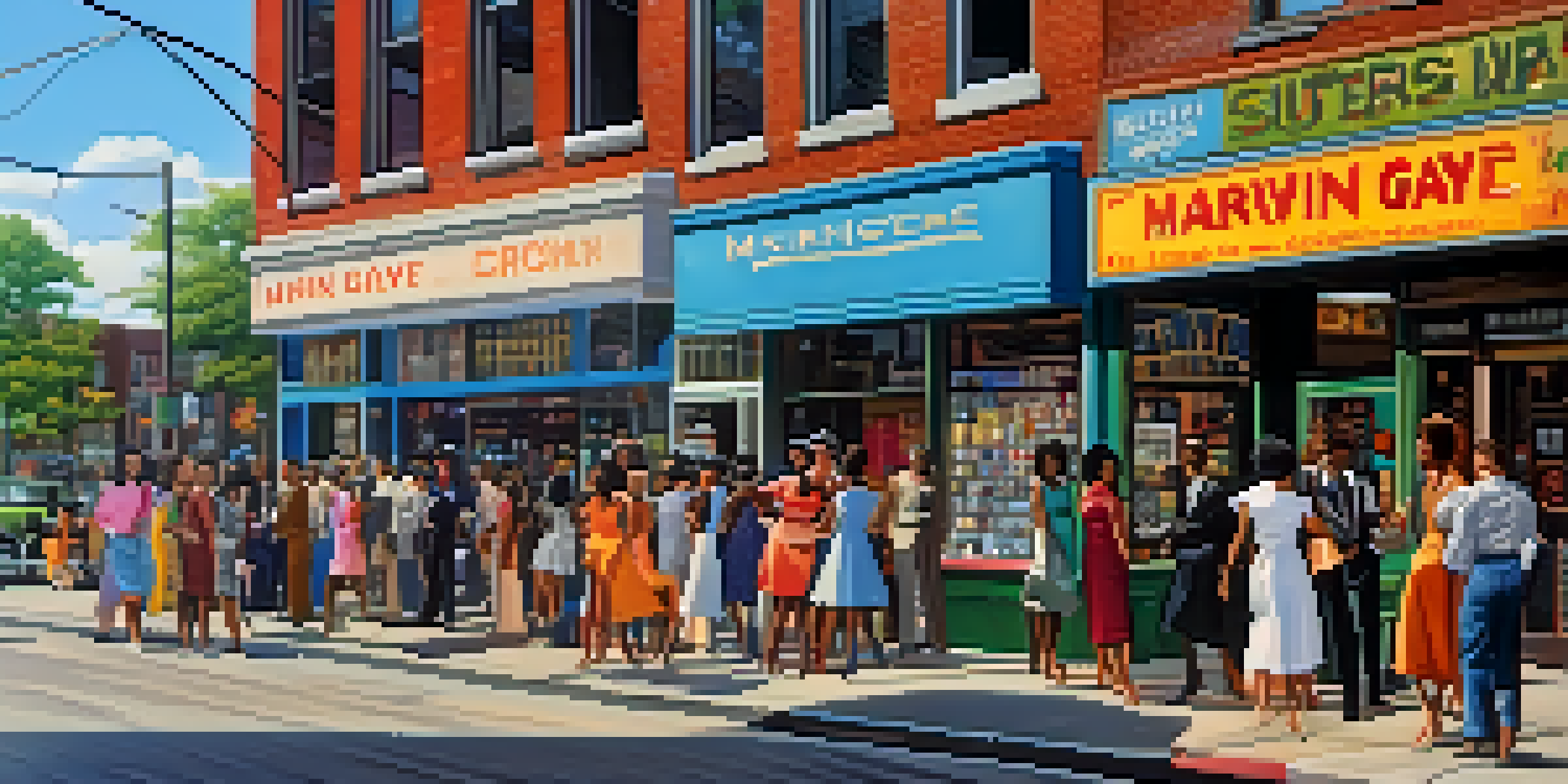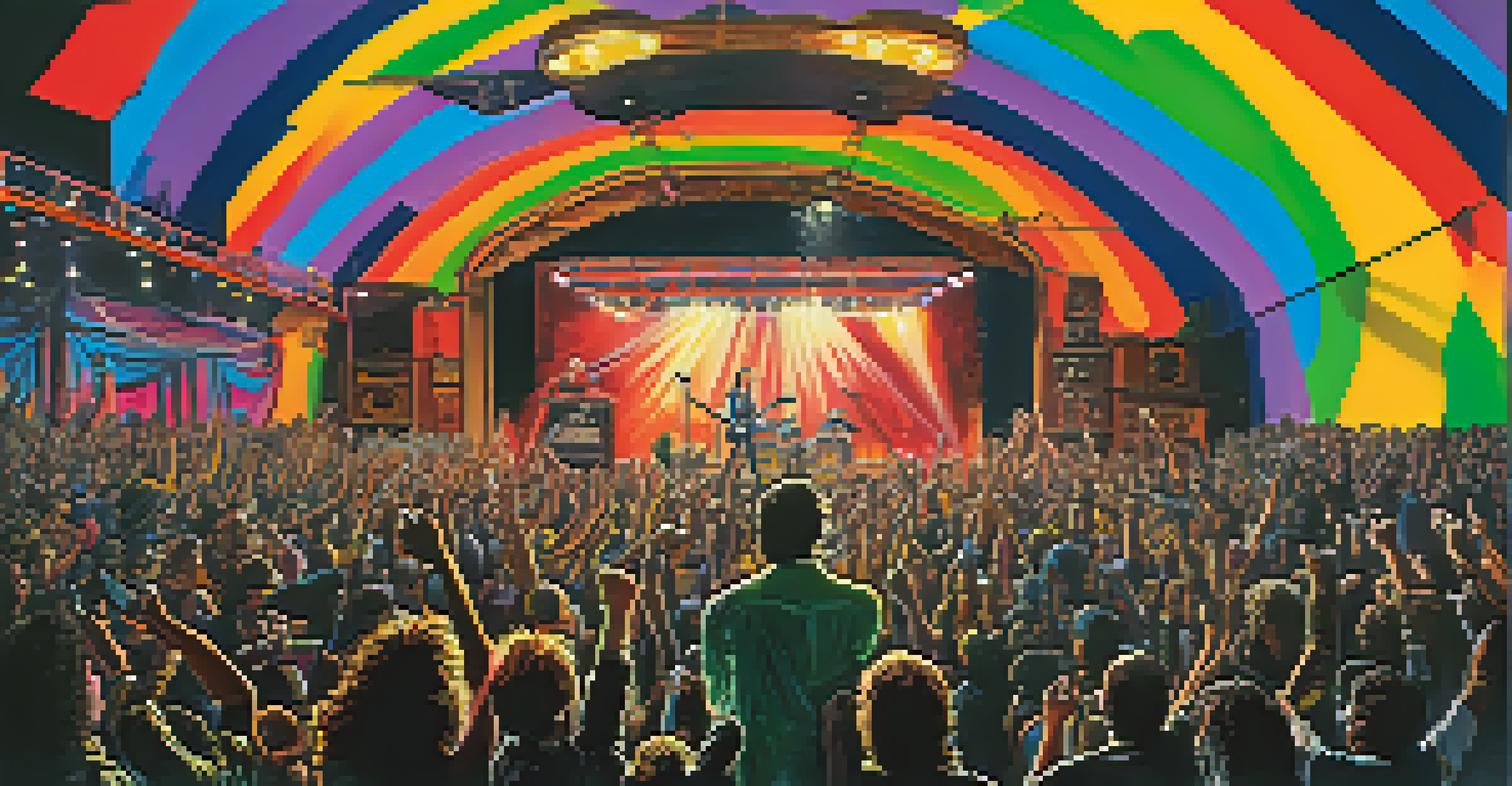The Evolution of Detroit's Musical Landscape Across Decades

The Birth of Motown: The 1960s Musical Revolution
In the 1960s, Detroit became the epicenter of a musical revolution with the birth of Motown Records. Founded by Berry Gordy, Motown was more than just a label; it was a cultural phenomenon that produced legendary artists like Marvin Gaye and Diana Ross. This era showcased a unique blend of soul, pop, and rhythm that resonated not only in America but across the globe.
Motown was not just a record label; it was a cultural movement that transformed the landscape of American music.
The Motown sound, characterized by its catchy melodies and polished production, appealed to a wide audience, breaking racial barriers in music. Hits like 'My Girl' and 'Ain't No Mountain High Enough' became anthems of the era, symbolizing hope and unity during a tumultuous time in American history. The label's signature style set a standard that influenced countless artists in the decades to come.
Motown's impact on Detroit's identity cannot be overstated; it put the city on the musical map and created a legacy that continues to inspire. The artists, songwriters, and producers of Motown not only shaped the sound of the 60s but also left an indelible mark on the broader landscape of popular music.
The Rise of Rock and Punk: The 1970s Scene
As the 1970s rolled in, Detroit's musical landscape began to shift towards rock and punk, creating a new wave of raw and rebellious sounds. The city became a breeding ground for influential bands like The Stooges and MC5, who challenged the norms and captured the disillusionment of the youth. Their music was loud, gritty, and unapologetically honest, reflecting the social climate of the time.

The punk movement, with its DIY ethos, found a home in Detroit's underground scene. Venues like the Grande Ballroom became hotspots for fans eager to experience the energy of live performances. This era not only showcased local talent but also attracted national attention, marking Detroit as a pivotal player in the rock and punk genres.
Motown's Cultural Impact
Motown Records, founded in the 1960s, not only created iconic music but also broke racial barriers and shaped Detroit's cultural identity.
Detroit's identity as a rock and punk hub allowed it to stand out from other cities. The fusion of Motown's melodic sensibility with the raw energy of punk created a musical landscape that was complex and unique, setting the stage for future genres to emerge.
The Birth of Techno: Pioneering the Electronic Frontier in the 1980s
In the 1980s, Detroit witnessed the birth of techno, a genre that would revolutionize music worldwide. Pioneered by artists such as Juan Atkins, Derrick May, and Kevin Saunderson, techno combined elements of electronic music with the city's rich musical heritage. This innovative sound emerged from underground clubs, where DJs experimented with synthesizers and drum machines.
Techno is a very personal experience. It’s a reflection of the individual, the artist, and the unique spirit of Detroit.
Techno was more than just music; it was a cultural movement that embraced freedom and creativity. The infamous Detroit Electronic Music Festival (now known as Movement) celebrated this genre and attracted fans from around the globe, solidifying Detroit's reputation as the birthplace of techno. The sound was futuristic, yet it drew from the city's industrial roots, creating an intriguing juxtaposition.
As techno evolved, it transformed into various subgenres, influencing artists and scenes worldwide. Detroit's contribution to electronic music continues to resonate, as the genre remains a staple in clubs and festivals, showcasing the city's lasting impact on the global music landscape.
Hip-Hop's Emergence: Detroit in the 1990s
The 1990s marked a significant turning point for Detroit's musical identity with the emergence of hip-hop. Artists like J Dilla and Slum Village brought a unique sound to the genre, blending lyrical prowess with innovative production techniques. This era showcased the creative diversity of Detroit, as local artists began to gain national recognition.
Detroit hip-hop was characterized by its soulful samples and hard-hitting beats, setting it apart from the dominant styles of the time. The city's rich musical history influenced the sound, as artists drew inspiration from Motown and jazz, creating a distinct fusion that resonated with listeners. Tracks like 'Fall in Love' by Slum Village became staples, showcasing the lyrical depth and musicality of Detroit's hip-hop scene.
Detroit's Musical Evolution
From the punk and rock scenes of the 1970s to the rise of hip-hop in the 1990s, Detroit's music continually adapts and reflects its diverse community.
As the decade progressed, Detroit became a crucial player in the hip-hop landscape, paving the way for future generations of artists. The legacy of 90s hip-hop continues to influence contemporary musicians, proving that Detroit's musical evolution is far from over.
The 2000s: A Resurgence of Diversity in Detroit Music
Entering the 2000s, Detroit's music scene flourished with a resurgence of diverse genres and artists. The decade saw a blend of hip-hop, rock, and electronic music, reflecting the city's eclectic cultural landscape. Artists like Eminem and Kid Rock emerged, each bringing their unique styles and stories to the forefront, further solidifying Detroit's reputation as a musical powerhouse.
The resurgence also included a revival of the Motown sound, with contemporary artists paying homage to the genre that put Detroit on the map. Local musicians began to experiment with the classic Motown formula, infusing it with modern elements, creating a fresh take on a beloved sound. This blending of old and new attracted both local and national attention, showcasing the city's rich musical heritage.
As Detroit's music scene expanded, it continued to attract talent from various backgrounds. The flourishing arts community and a supportive ecosystem for musicians allowed for collaboration and innovation, ensuring that Detroit remained a vibrant and influential player in the music industry.
The Influence of Technology: The 2010s and Beyond
The 2010s brought significant technological advancements that reshaped Detroit's musical landscape. With the rise of digital music platforms and social media, artists found new ways to share their work and connect with fans. This accessibility allowed for a diverse array of voices to emerge, representing the city's rich cultural tapestry.
Local musicians began to leverage platforms like SoundCloud and Bandcamp, allowing them to distribute their music without the constraints of traditional record labels. This democratization of music led to a flourishing underground scene with genres like alternative R&B and experimental electronic music gaining traction. Artists like Danny Brown and Jessie Reyez pushed boundaries, showcasing the city's innovative spirit.
Technological Influence on Music
The advent of digital platforms in the 2010s has democratized music distribution, allowing Detroit's artists to thrive and innovate in a rapidly changing landscape.
As technology continues to evolve, Detroit's music scene remains at the forefront of creativity and experimentation. The city's legacy as a musical hub is not just preserved; it's thriving, reflecting the resilience and adaptability of its artists.
The Future of Detroit Music: A New Era of Innovation
Looking ahead, the future of Detroit's musical landscape is bright and filled with promise. With a new generation of artists emerging, the city is ripe for continued innovation and experimentation. From hip-hop to electronic and everything in between, Detroit's music scene is a melting pot of styles and influences that reflects its diverse community.
Local initiatives and organizations are fostering collaboration among artists, encouraging cross-genre experimentation and support. This environment of creativity is leading to exciting projects and collaborations, ensuring that Detroit remains a relevant force in the global music scene. The city's rich musical history serves as both a foundation and inspiration for future generations.

As Detroit continues to evolve, it will undoubtedly maintain its identity as a city with deep musical roots. The legacy of its past will fuel the creativity of its future, ensuring that the city's vibrant soundscape continues to captivate and inspire for years to come.